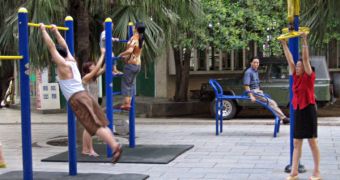According to a new scientific research, which has unfolded over more than two decades, Canadian adults are highly inactive, and spend very little time exercising when they have some time off. When comparing results from previous studies, taken in 1981, 1988, and 2002/4, experts learned that only 12 percent of the surveyed individuals maintained a healthy lifestyle throughout. Some 56 percent of them remained completely inactive over the past 22 years, and were, therefore, subjected to the risk of developing a number of medical conditions as a result.
The new article detailing the trends, published in a recent issue of the International Journal of Behavioral Nutrition and Physical Activity, incorporates data from three other national-scale surveys, namely the Canada Fitness Survey of 1981, the Campbell's Survey of Well-Being of 1988, and the Physical Activity Longitudinal Study of the Canadian Fitness and Lifestyle Research Institute, taken between 2002 and 2004. As the data spanned such a long time frame, it may be considered representative of the entire population, the experts say.
“Women and older participants, compared to men or their younger peers, were less likely to follow a consistently active lifestyle. And participants with less education and lower household income were also less likely to be active,” Sainte-Justine University Hospital Research Center Researcher Tracie A. Barnett shared. The researcher, who is also the lead author of the new study, is a Professor at the Universite de Montreal Department of Social and Preventive Medicine.
“There is a need for continued and targeted health-promotion efforts, ideally during childhood and adolescence but also in adulthood, to ensure that Canadians remain physically active across the lifespan. Because so few adults reverse behaviors acquired in early adulthood and because many active youths become sedentary adults, programs must target the entire population,” Centre de Recherche du Centre Hospitalier de l'Universite de Montreal expert Dr. Lise Gauvin added. She is also a researcher at the Centre de Recherche Lea-Roback sur les Inegalites Sociales de Sante de Montreal.

 14 DAY TRIAL //
14 DAY TRIAL //